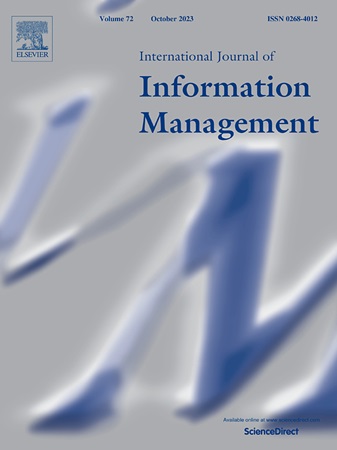Moral appraisals of generative AI: How mindset framing shapes moral judgments, emotional appraisals and privacy behavior
IF 27
1区 管理学
Q1 INFORMATION SCIENCE & LIBRARY SCIENCE
International Journal of Information Management
Pub Date : 2025-06-12
DOI:10.1016/j.ijinfomgt.2025.102940
引用次数: 0
Abstract
The rapid development of Generative AI (GenAI) and similar technologies has heightened ethical concerns, including privacy issues, discrimination, and data security. However, there is limited understanding of how mindset framing shapes users’ moral judgments and emotional responses toward these technologies. To address this gap, this research examines how framing GenAI, particularly in terms of growth or fixed mindset, influences moral appraisals, emotional reactions, and privacy behaviors. Using a mixed-methods approach, this research combines text mining of a large field dataset (n = 18,035 reviews) with two experimental studies (n = 255 participants). Findings reveal that mindset framing directly influences perceived morality, suggesting that GenAI framed in a growth mindset evokes more positive moral judgments compared to a fixed mindset framing. A growth mindset suggests learning and adaptability, whereas a fixed mindset framing implies that it is immutable and incapable of improvement. Perceived moral judgments mediate the effect of mindset framing (growth vs. fixed) on emotional appraisals. Moreover, mindset framing influences privacy behavior, with participants having low (vs. high) expertise disclosing more under a growth (vs. fixed) mindset. Theoretically, this paper contributes to the literature by integrating key theories on moral judgment, implicit theories, cognitive appraisal theory, and privacy calculus theory, thereby deepening the understanding of moral appraisals regarding GenAI. In practical terms, this research enables organizations to strategically frame GenAI capabilities, positively influencing users' privacy behavior and emotional responses.
生成式人工智能的道德评价:思维框架如何塑造道德判断、情感评价和隐私行为
生成式人工智能(GenAI)和类似技术的快速发展加剧了伦理问题,包括隐私问题、歧视和数据安全。然而,对于思维定式如何影响用户对这些技术的道德判断和情感反应,人们的理解有限。为了解决这一差距,本研究考察了构建GenAI,特别是在成长或固定心态方面,如何影响道德评价、情绪反应和隐私行为。本研究采用混合方法,将大型字段数据集(n = 18,035篇评论)的文本挖掘与两个实验研究(n = 255名参与者)相结合。研究结果表明,心态框架直接影响感知道德,这表明与固定心态框架相比,成长型心态中的GenAI框架唤起了更积极的道德判断。成长型思维模式意味着学习和适应能力,而固定型思维模式意味着它是不可改变的,无法改进。感知道德判断介导心态框架(成长vs固定)对情绪评价的影响。此外,心态框架影响隐私行为,在成长心态(与固定心态相比)下,低(与高)专业知识的参与者披露更多。在理论上,本文通过整合道德判断、内隐理论、认知评价理论、隐私演算理论等关键理论,进一步深化了对GenAI道德评价的认识。在实践中,本研究使组织能够战略性地构建GenAI功能,积极影响用户的隐私行为和情绪反应。
本文章由计算机程序翻译,如有差异,请以英文原文为准。
求助全文
约1分钟内获得全文
求助全文
来源期刊

International Journal of Information Management
INFORMATION SCIENCE & LIBRARY SCIENCE-
CiteScore
53.10
自引率
6.20%
发文量
111
审稿时长
24 days
期刊介绍:
The International Journal of Information Management (IJIM) is a distinguished, international, and peer-reviewed journal dedicated to providing its readers with top-notch analysis and discussions within the evolving field of information management. Key features of the journal include:
Comprehensive Coverage:
IJIM keeps readers informed with major papers, reports, and reviews.
Topical Relevance:
The journal remains current and relevant through Viewpoint articles and regular features like Research Notes, Case Studies, and a Reviews section, ensuring readers are updated on contemporary issues.
Focus on Quality:
IJIM prioritizes high-quality papers that address contemporary issues in information management.
 求助内容:
求助内容: 应助结果提醒方式:
应助结果提醒方式:


